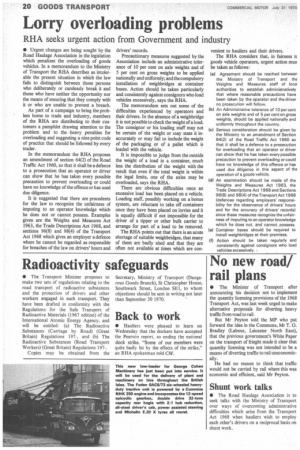Lorry overloading problems
Page 22

If you've noticed an error in this article please click here to report it so we can fix it.
RHA seeks urgent action from Government and industry
• Urgent changes are being sought by the Road Haulage Association in the legislation which penalizes the overloading of goods vehicles. In a memorandum to the Ministry of Transport the RHA describes as intolerable the present situation in which the law fails to distinguish between those persons who deliberately or carelessly break it and those who have neither the opportunity nor the means of ensuring that they comply with it or who are unable to prevent a breach.
As part of a campaign to bring the problem home to trade and industry, members of the RHA are distributing to their customers a pamphlet drawing attention to the problem and to the heavy penalties for overloading and suggesting a nine point code of practice that should be followed by every trader.
In the memorandum the RHA proposes an amendment of section 64(2) of the Road Traffic Act 1960, so that it shall be a defence to a prosecution that an operator or driver can show that he has taken every possible precaution to prevent overloading or could have no knowledge of the offence or has used due diligence.
It is suggested that there are precedents for the law to recognize the unfairness of imputing to an operator knowledge which he does not or cannot possess. Examples given are the Weights and Measures Act 1963, the Trade Descriptions Act 1968, and sections 96(8) and 98(4) of the Transport Act 1968 which gives an employer a defence where he cannot be regarded as responsible for breaches of the law on drivers' hours and drivers' records.
Precautionary measures suggested by the Association include an administrative tolerance of 10 per cent on axle weights and of 5 per cent on gross weights to be applied nationally and uniformly; and the compulsory installation of weighbridges at container bases. Action should be taken particularly and consistently against consignors who load vehicles excessively, says the RHA.
The memorandum sets out some of the difficulties experienced by operators and their drivers. In the absence of a weighbridge it is not possible to check the weight of a load. The consignor or his loading staff may not be certain of the weight or may state it inaccurately or may fail to include the weight of the packaging or of a pallet which is loaded with the vehicle.
It is impossible to judge from the outside the weight of a load in a container, much less the distribution of the weight with the result that even if the total weight is within the legal limits, one of the axles may be overloaded, says the RHA.
There are obvious difficulties once an excessive load has been placed on a vehicle. Loading staff, possibly working on a bonus system, are reluctant to take off containers once they have been placed on lorries and it is equally difficult if not impossible for the driver of a tipper or other bulk carrier to arrange for part of a load to be removed.
The RHA points out that there is an acute shortage of suitable weighbridges, that many of them are badly sited and that they are often not available at times which are con
venient to hauliers and their drivers.
The RHA considers that, in fairness tc goods vehicle operators, urgent action mus be taken as follows:
(al Agreement should be reached between the Ministry of Transport and the
Weights and Measures staff of local authorities to establish administratively that where reasonable precautions have been taken by the operator and the driver no prosecution will follow, (b) An Administrative tolerance of 10 per cent on axle weights and of 5 per cent on gross weights, should be applied nationally and uniformly throughout the country.
(c) Serious consideration should be given by the Ministry to an amendment of Section 64(2) of the Road Traffic Act 1960 so that it shall be a defence to a prosecution for overloading that an operator or driver can show that he has taken every possible precaution to prevent overloading or could have no knowledge of this offence or has used due diligence in this aspect of the operation of a goods vehicle.
Id) An examination should be made of the Weights and Measures Act 1963, the Trade Descriptions Act 1968 and Sections
96(8) and 98(4) of the Transport Act 1968 (defences regarding employers' responsi
bility for the observance of drivers' hours and for the accuracy of drivers' records) since these measures recognize the unfairness of imputing to an operator knowledge which he does not, and cannot, possess.
(e) Container bases should be required to install weighbridges at their premises.
(f) Action should be taken regularly and consistently against consignors who load vehicles excessively.
































































































